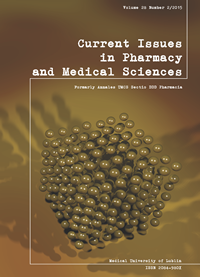Bipolar affective disorder: A review of novel forms of therapy
DOI:
https://doi.org/10.1515/cipms-2015-0054Keywords:
allopurinol, memantine, acetylsalicylic acid, ketamine, modafinil, tamoxifen, N-acetylcysteineAbstract
Normothymic, antidepressant and antipsychotic pharmaceutics are, in accordance with international guidelines, employed both in the therapy and the prevention of bipolar disorder (BD). Long-term studies on the mechanisms of action of such medications, as well as on the pathogenetic background of BD, have led to the discovery of effective, albeit unconventional pharmacotherapeutic approaches. These methods have the potential to successfully treat mania and depression, as well as to counter affective episode relapse.
Allopurinol – commonly used to treat gout, secondary hyperuricemia and Lesch-Nyhan syndrome, acts by inhibiting the synthesis of uric acid, levels of which are often increased in manic patients. Due to this, an evaluation of the potential effect of allopurinol on the reduction of mania symptoms seems to be reasonable. Additionally, the numerable research papers coming out of research regarding the role of purine neurotransmitters in mood alterations, indicate that adenosine agonists act analogously to dopamine antagonists.
N-acetylcysteine (NAC), a supporting agent in the pharmacotherapy of depressive episodes in bipolar disorder, substantially accelerates mood stabilization in patients. In turn, memantine, known for its procognitive effect, not only has antimanic and normothymic properties, but also boosts the neuroprotective action of traditional lithium therapy.
In view of the latest opinions, the subtle pro-inflammatory process is typical for the pathophysiology of bipolar disease. Acetylsalicylic acid (ASA) (a popular analgesic, antipyretic and antiphlogistic agent) may be useful in BD therapy. This is because that, via its effect upon cyclooxygenase-1 (COX-1) and cyclooxygenase-2 (COX-2), ASA modulates leukocyte recruitment in neuro-inflammation.
Apart from the above-mentioned medications, this article introduces the results of recent investigations of ketamine, modafinil and tamoxifen, including their receptor mechanisms, as well as certain genetic aspects or elements of their pharmacodynamics, for use in BD therapy. We put forward that, possibly, more insightful cognition of these drugs will allow significant enrichment in the range of pharmacotherapy for BD in the near future.
References
1. Amrollahi Z. et al.: Double-blind, randomized, placebo-controlled 6-week study on the efficacy and safety of the tamoxifen adjunctive to lithium in acute bipolar mania. J. Affect. Disord., 129, 327, 2011.
2. Anand A. et al.: Early antidepressant effect of memantine during augmentation of lamotrigine inadequate response in bipolar depression: a double-blind, randomized, placebo-controlled trial. Bipolar Disord., 14, 64, 2012.
3. Berk M. et al.: Maintenance N-acetyl cysteine treatment for bipolar disorder: A double-blind randomized placebo controlled trial. Berk et al. BMC Med., 10, 91, 2012.
4. Berk M. et al.: The efficacy of N-acetylcysteine as an adjunctive treatment in bipolar depression: An open label trial. J. Affect. Disord., 135, 389, 2011.
5. Dell’Osso B. et al.: Superior chronic tolerability of adjunctive modafinil compared to pramipexole in treatment-resistant bipolar disorder. J. Affect. Disord., 150, 130, 2013.
6. Fan A. et al.: Allopurinol augmentation in the outpatient treatment of bipolar mania: a pilot study. Bipolar Disord., 14, 206, 2012.
7. Gao Y. et al.: Memantine reduces mania-like symptoms in animal models. Psychiatry Res., 188, 366, 2011.
8. Ionescu D.F. et al.: A single infusion of ketamine improves depression scores in patients with anxious bipolar depression. Bipolar Disord., 17(4), 438, 2015, doi: 10.1111/bdi.12277.
9. Jahangard L. et al.: In a double-blind, randomized and placebocontrolled trial, adjuvant allopurinol improved symptoms of mania in in-patients suffering from bipolar disorder; Eur. Neuropsychopharmacol., 24, 1210, 2014.
10. Koukopoulos A. et al.: The sustained mood-stabilizing effect of memantine in the management of treatment resistant bipolar disorders: Findings from a 12-month naturalistic trial; J. Affect. Disord., 136, 163, 2012.
11. Kulkarnia J. et al.: A four week randomised control trial of adjunctive medroxyprogesterone and tamoxifen in women with mania; Psychoneuroendocrino., 43, 52, 2014.
12. Lally N. et al.: Anti-anhedonic effect of ketamine and its neural correlates in treatment-resistant bipolar depression; Transl. Psychiatry, 4, e469; doi:10.1038/tp.2014.10, 2014.
13. Magalhaes P.V. et al.: N-acetyl cysteine add-on treatment for bipolar II disorder: a subgroup analysis of a randomized placebo-controlled trial; J. Affect. Disord., 129, 317, 2011.
14. Nguyen T.V. et al.: Hormonal Treatments for Bipolar Disorder: A Review of the Literature; Journal of Behavioral and Brain Science, 2, 48, 2012.
15. Niemegers P. et al.: Pharmacokinetic evaluation of armodafinil for the treatment of bipolar depression; Expert Opin. Drug Metab. Toxicol., 8(9), 1189, 2012.
16. Permoda-Osip A. et al.: Factors connected with efficacy of single ketamine infusion in bipolar depression; Psychiatr. Pol., 48, 35, 2014.
17. Savitz J. et al.: Minocycline and aspirin in the treatment of bipolar depression: a protocol for a proof-of-concept, randomised, doubleblind, placebo-controlled, 2x2 clinical trial; BMJ Open, 2, e000643, 2011.
18. Sienaert P. et al.: Evidence-based treatment strategies for treatmentresistant bipolar depression: a systematic review; Bipolar Disord., 15, 61, 2013.
19. Stanley I.: Lithium and the Other Mood Stabilizers Effective in Bipolar Disorder Target the Rat Brain Arachidonic Acid Cascade; ACS Chem. Neurosci., 5, 459, 2014.
20. Stertz L., Magalha P.V.S., Kapczinski F.: Is bipolar disorder an inflammatory condition? The relevance of microglial activation; Curr. Opin. Psychiatry, 26,19, 2013.
21. Weiser M. et al.: Allopurinol for mania: a randomized trial of allopurinol versus placebo as add-on treatment to mood stabilizers and/or antipsychotic agents in manic patients with bipolar disorder; Bipolar Disord., 16, 441, 2014
Downloads
Published
Issue
Section
License
Copyright (c) 2015 Authors

This work is licensed under a Creative Commons Attribution-NonCommercial-NoDerivatives 3.0 Unported License.


